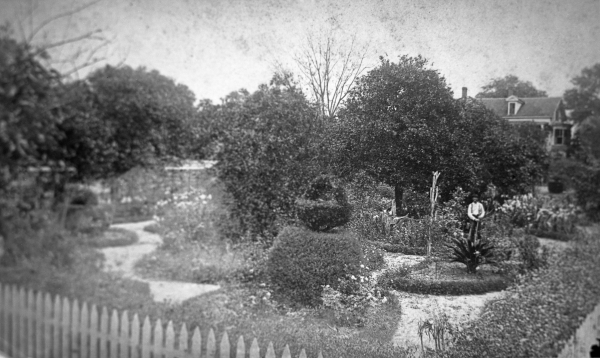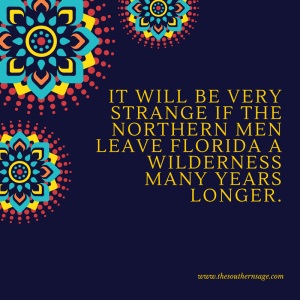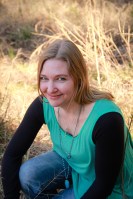
Florida 40 Years Ago
RANDALL’S REMINISCENCES OF THE LAND OF FLOWERS
Beckoning of the Unseen Hand-staging Across the Peninsula – Chronicles of a Dead Village with a Living Memory
For The Times-Democrat.
Some months ago I picked up a census bulletin of Florida and curiously scanned the report from a little settlement or village called Bayport on the Gulf coast. If anything the population, which was a mere handful, nearly forty years ago, has diminished. My interest in Bayport is founded upon some youthful experience, and I am not apt to forget the spot “while memory holds seat in this distracted globe.” Once, a few years ago, when in transformed Florida I had a great desire to revisit the scenes of my boyhood in the Land of Flowers, but circumstance, “the unspiritual god,” prevented.

I happened, about 1858, when residing in Baltimore, my birthplace, to be consumed with a “grand discontent,” which presumably, impels so many persons, great and small, to seek fresh fields and pastures new, for African or Polar discovery, for gold or glory, for the love of self or for the love of God. The motives for such movements are multiform just as the impelling agencies are as varied as contradictory. I saw, or thought I saw, in my boyhood after leaving college, that my birthplace was not favourable for my material development. Perhaps I was, even then, like a hero of Guy Mannering, stirred to action by the voice mysterious which says we must not stay, and by the providential hand that beckons us away. About this restless period there came to Baltimore, on a visit, a relative of my mother, who had long resided in Florida, and, being something of a local politician, was enjoying a small government position at Bayport for headquarters. This gentleman and kinsman, Mr. C. T. Jenkins, stimulated my imagination about Florida and stated that, if I cared to go there, he would do whatever he could for me. Meanwhile I ransacked a public library for knowledge of the State and really absorbed considerable historic and other useful information on the subject. My mind was fired with stories of Ribault, Ponce de Leon, Osceola, Coachocee and other conspicuous persons, who had, in different times and varied fashions, illustrated the lands. Pending any final determination to discover Bayport, my cousin gave me a letter of introduction to the then “king bee” of the Commonwealth, Senator David L. Yulee, asking him, if possible, to secure for me a government office. I called promptly on the Senator, who lived in comfort and some style at Washington, for he was a rich man, what we call “a man of affairs,” and he grew richer and richer, I believe, in spite of political retirement, war, reconstruction and the multitude of schemes devised by the knowing ones to pluck the traditional goose. Senator Yulee, at his leisure, answered my card in person. He was a rather short, sturdy man, with decided Hebraic countenance of an Oriental cast. The face [botchered] serious shrewdness and an absence of sunshine or humor. he made quick, frank work with my business, gave me no encouragement at all and dismissed me with frigid politeness. I was much galled at the time by this jejune experience of the Washington politician, not expecting that, in years to come, when Mr. Yulee was practically forgotten, and much afflicted, in spite of opulence, at the Federal capital, my intercourse with much greater men there would come later on, after tarrying at Jericho for the growth of beard. Mr. Yulee’s name was originally Levy, and I think that Charleston was his native place. There used to be some story about one of his progenitors having played a notable part in the Kingdom of Morocco, but how much truth or fiction there is in this I do not know. He certainly looked like a man who had a swarthy Semitic ancestor.

When Senator Yulee, much against my will and quite indifferently on his part, saved me from becoming at the outset of my career, in the working world, a department clerk, I resolved to make a trip, if possible, to the State he partly represented. My dear mother, with many misgivings and much sorrow, helped me on the way. She gave me a diamond ring, one of the few left of many, and permitted me to dispose of it. I did not see her dear face again for six or seven years. A German-American merchant friend advanced me $75 on the bauble, and, at the age of nineteen, in rather delicate health, I started for Bayport, via Savannah, on an old-fashioned steamship. Though I had previously gone thousands of miles, by sailing craft, on an ocean voyage, and escaped sickness peculiar to the sea, I experienced on that venerable tub, with its convulsive motions, a sharp attack of the malady that, while it lasts, permits the sufferer to fear life more than death. I understand that a dose of one teaspoonful of chloroform in a tumblerful of water, taken when one goes on board ship, and, if necessary, repeated an hour afterward, is a specific remedy. I was well, however, when we steamed off Tybee and up the muddy and then shallow Savannah river. Incidentally I heard that, far up the river, there was a city called Augusta, and I was tempted to visit it, but did not yield to the seduction. Indeed, when I presently boarded the steamboat for inland passage to Palatka, on the St. Johns river, nothing was remoter from my thoughts than the possibility of my ever seeing Augusta, to which I was curiously led after much tribulation and numerous vicissitudes interspersed here and there with some happy times and some romantic episodes in Florida and Louisiana.
My spirits lifted when I had snug passage on the steamboat, after escaping the wiles of an adventurous acquaintance, with small pecuniary loss. I was delighted with Savannah and the novel sights of semi-tropical slave States. I wondered what Providence had in store for me, and I built many castles in the air. In those days Col. Randolph Spalding was the great man most admired and talked about around the Sea Islands. Possibly he had just figured in some “affair of honor,” and I was gravely assured by some talkative gossip that in such matters Col. Spalding was a most valuable ally.

Our steamboat, despite occasional impediment, made very fair headway, and it was with a thrill of delight that I saw her nose pointed to the open sea and knew that the mouth of the St. Johns river was not far off. At sea I had a glimpse of the devil fish, a monster of those waters, and as we crossed the St. Johns bar marine birds of nearly every variety and incredibly numerous either darkened the air with their flight or had dress parade on the beach. Patent rifles or shotguns had not yet been invented for exterminating wild fowls and beasts, so Florida, a comparative wilderness, abounded superlatively in all manner of game common to this part of the continent.

The trip up the river to Palatka is still an enchanting one, and I, in that early period, hugely enjoyed my freedom and all the sights and sounds of nature calculated to stimulate a poetic fancy. In those days Palatka was a shabby village when contrasted with present splendour, and the tavern I slept at was a sorry barn compared with the palaces that have since replaced it. After breakfast next morning I was introduced to the stage driver, who also had charge of the United States mail. He was a young Irishman of stalwart frame and pretty well educated. He was a very amiable man, but resolute. He drove the stage, really a hack, from the St. Johns river at Palatka to Bayport, on the Gulf coast, a pretty long trip over sandy roads. I suppose that the tedious journey rather daunted me prospectively, but only for a moment, for I was young, eager and visionary and anxious to try what the world had in store for me. So Magrath and I started together overland, and what with my frequent questions and his gracious answers constituting time absorbing conversation, I managed to be patient. After travelling all day through a rather monotonous country, where settlements were few and far between, we halted for the night at the spacious cabin of a farmer near the Withlacoochee river and in the vicinity of Dade’s massacre. As we talked by the light of a pine knot fire hounds under the house emitted yelps of fear or excitement. I asked what was the matter and learned that wolves were prowling around. They had killed a calf in the cow-pen the night before, and had evidently returned for another bait. The hunting dogs did not evidently care to venture forth, and the farmer, though a keen sportsman, kept his place and preferred, apparently, to tell me his droll yarns and politely listen to some of mine. It was a pleasure in those days for people in the wilderness to meet strangers from outside civilization. Next morning the hack started early, and we expected to reach Bayport some time in the early nightfall. On the road we saw deer in some abundance, although many thousands had just died of the black tongue. Wolf and bear tracks were visible, I believe, to Magrath’s expert eye, but we saw none of these animals. Afterward, when I lived at Bayport, deer ran through the village, it was said betimes, panthers were killed or committed ravage in neighboring fields, and wagoners declared that they had to beat bear out of the road. We took dinner, I think, at Brooksville, which was the county site of Hernando, whose rolling, hammock lands, rich and productive, were then largely given to profitable cotton culture.

There is a railway belonging to my friend Mr. Plant that now terminates at Brooksville, but I suspect, unless the improbably should happen freakishly, steel track and locomotive will never, in our day, be pushed to Bayport, which, somehow, appears to be, even at the threshold of the tremendous 20th century, a hamlet that barely keeps from being actually dead. Well, my spirits were somewhat dampened when I saw the poor place, in the gloaming, but I did not realize until the following day what was really in store for me, a child of civilization. My cousin, then an old bachelor, that is old to my youthful eyes, received me kindly. The one grand place was that of Maj. John Parsons who had accumulated a fortune during the Seminole war, and, being a practical as well as a highly educated man, was adding to it by stores and other commercial ventures on this coast. The Parsons house was a large one, substantially built, handsomely furnished and amply surrounded with a magnificent grove. The Major had married a niece of Commodore Decatur, a most estimable lady, whose brother and sister lived with her. Major Parsons had a nephew who was also one of the family. That night of my arrival there was a big party at the Parsons mansion. I went of course and had a fine time. I took for granted that all present were Bayport folks and, as some of the girls were very pretty and accomplished, I concluded that my lines had not fallen in such bad places after all. To my consternation, next morning, I had discovered that all of the bright young company had come from Cedar Keys and would take the steamboat to that place about noon. When they vanished my heart fairly sank within me. The whole prospect grew desolate, for, with the few exceptions I have mentioned, there was no congenial society at all and how I was to make a living, in such a quasi-barbarism, passed all understanding.

However, I plucked up my courage by its drowning lock, and prepared for the best or worst. How I passed the time there, how I interested myself in some rather remarkable persons whom I can never forget, and how I emerged from the wilderness back again to civilization may be left to another occasion, when the reader, if he or she choose, after the manner of the serial novel, may continue the narrative, which, possibly, shall increase in interest. There was, all the time, a providential magnet drawing me to another sphere of action which largely determined the bent of my whole after existence in this world, and it may divert, if not instruct, some of my kind readers to learn how a fellow mortal was strangely, providentially guided in his earthly pilgrimage.
JAMES R. RANDALL
- The Times-Democrat (New Orleans, Louisiana) 14 July 1895

Marsanne Petty conducts historical research about 18th century southern United States and environmental history. To get more great updates and original history, sign up at The Southern Sage. To get her to help you with your own research project, email mapetty[at]gmail.com.












You must be logged in to post a comment.